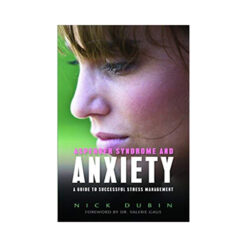One of the biggest, most all-encompassing issues we manage in our autistic lives is anxiety. We stress about everything and everything is stress.
The Science
The magnitude and frequency of our reactions to stressors are partly biological due to the ways our brains are built. Scientists are studying the chicken/egg nature of anxiety in our grey matter so, as with many facets of autistic life, definitive explanations do not yet exist. Did we arrive in the world with large and active amygdalae or do they grow to accommodate our interactions with stimuli? The scientific community is hard at work to provide those answers and more. In the meantime…
What’s more pertinent than the hows and whys is understanding that reacting strongly to input is part and parcel of our bodies’ structure. We may as well stop chastising ourselves for “overreacting”, stop measuring ourselves against everyone else’s standards of behaviour, and learn to manage our anxiety in ways that work for us.
Five Ways To Slay The Anxiety Monster
There are many, many titles published on anxiety management but only a few tailored for our autistic minds. And that’s important because, as bears repeating, our *actual brain structure* for handling stressors is different than most. Think of us as the tiny mouse running through a pack of cats to get the cheese on the other side of the room. We are hypervigilant and extra-reactive, to say the least.
So, given that, how can we live our best lives? Here are five things you can try today. These have been adapted from Nick Dubin’s excellent guide, Asperger Syndrome and Anxiety: A Guide to Successful Stress Management.
Here we go!
1. Try not to change the situation. Adjust your view instead.
This is a tricky one as life teaches us to blame the trigger. Example: if a mosquito bites you, the mosquito is to blame. Problem: mosquitos. Solution: mosquito repellent. But what if you were a mosquito researcher? Then they’re not a problem so much as a source of fascination and study. When you inevitably get bitten, it’s irritating, sure, but it’s part of the job and life goes on. Your entire day isn’t ruined because of one bite. We can borrow from this approach.
The idea is to shift your point of view so the stressor has less importance in your life. How? It can help to pull back your focus from the details to the bigger picture. They didn’t have the meal you’d been excited about at the restaurant? That’s upsetting but how much does that matter considering all the great meals you’ve had before and all the ones you’ll have later? You lost your wallet on the subway? It will definitely be a hassle dealing with replacing everything and locking your accounts but when you’ve completed those tasks, won’t life be pretty much as it was before?
This ONE trick won’t magically reduce all your anxiety to zero. Nothing will do that. But you can give it a try. See if you can determine the situations where this shift in point of view does indeed make you feel better.
2. Set your judgement aside.
This is another tough one (no one said these would be easy). Everyone judges pretty much everything all the time. It’s the way our thought processes work. We measure the parts of life against our personal standards for safety, comfort, enjoyment, etc. but we have some wiggle room in there.
Negative judgement is when we assess a person, place, thing, or situation as not measuring up to what we expect or assume is acceptable. When we find something lacking, it causes stress. What would happen if we viewed things neutrally instead? To do this, we’d need to lighten our view of its impact on our lives (sound familiar?)
What does it really matter that someone made a snarky remark in your direction? They’re feeling less than great about themselves and need to belittle someone else to fix that. That has nothing to do with you. They might not even know you. If they do, they’re being unkind. Either way, nothing to do with you. And if it’s not important, it doesn’t affect your life negatively and that means, less anxiety. Of course that’s oversimplified but I hope it conveys the general idea.
3. Be aware of overdoing it.
Autistic brains take in a ton of information. We’re processing and making lists and teasing details apart all day long. It’s a lot, right? It also means that we probably shouldn’t expect ourselves to match activity levels with neurotypical people while simultaneously doing more.
Try acknowledging the work that you’re automatically doing. When you take time to notice, you’ll realize that the people around you seem capable of more because they’re not working with as much information during the same time period. For example, how many times have you noticed details in a room to which others were oblivious? They’ve been busy exchanging social cues while talking about the weather as you’ve been involuntarily inventorying your surroundings. Doing everything at once is asking a lot.
So give yourself a break. Stop demanding that you keep pace with the pack when you’re already driving in the express lane.
4. Enjoy more of the activities you love.
That’s right. Have more fun. Being active and engaged floods our brains with the happy chemistry needed to better handle the stresses of everyday life.
You know how some days you can take on anything and on others you can’t get out of bed? A lot of that has to do with what your brain is bathing in that day. You’ve heard it before and you’ll hear it again: get moving.
Take a brisk walk up a hill. Go smell some nature. Do those things you know for fact make you feel strong and good inside. The benefits of frequent activity accumulate like deposits in the bank. They’ll help smooth out the bumps that inevitably come.
5. Expect the unexpected.
Part of our nature seems to be wanting to lessen surprises. The more predictable life is, the happier we are. But life is unpredictable. There are too many moving variables to lock down 100% of the time. What’s an autist to do?
What if we tried planning for unpredictability? Say you’re at the beach and you want to build a sand castle with a moat that fills. You know there’s sand and you know there are waves but what you don’t know is how fast and hard those waves are going to come or when. You know there’s unpredictability. What do you do? You factor that into your plan and build that castle somewhere on the shoreline where you expect the water to either fill your moat nicely or obliterate your masterpiece. Either way, you’re good, right? It’s all part of the fun.
If we allow for a degree of randomness to our plans, we’re better able to ride them out when uncertainty comes. It’s not ideal, no, but isn’t it better than panic attacks that send us to the emergency room? Consider how much variability is okay with you. Plan for a few ways you might react. Taking a pause is always an option. Neutrality is another. Finding the humour in the situation is yet another.
It’s up to you.
Managing anxiety is a lifelong pursuit. There are no instant answers and one short article can’t possibly cover the subject but there a lot of great options to discover. I hope you’ll come away from this knowing that while most of life is in flux, you have everything you need within you to surf those waves. You are in charge of your own outlook, strategy toolbox, and resilience. These are skills you can acquire, not random traits you either possess or don’t. Ask for help. Rely on your resources. You got this.












